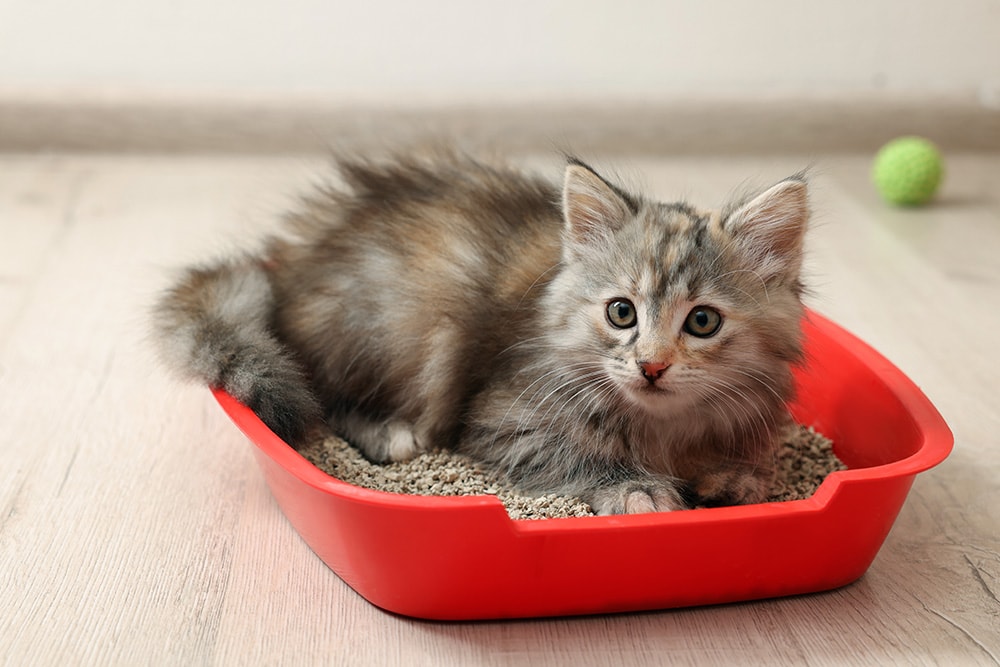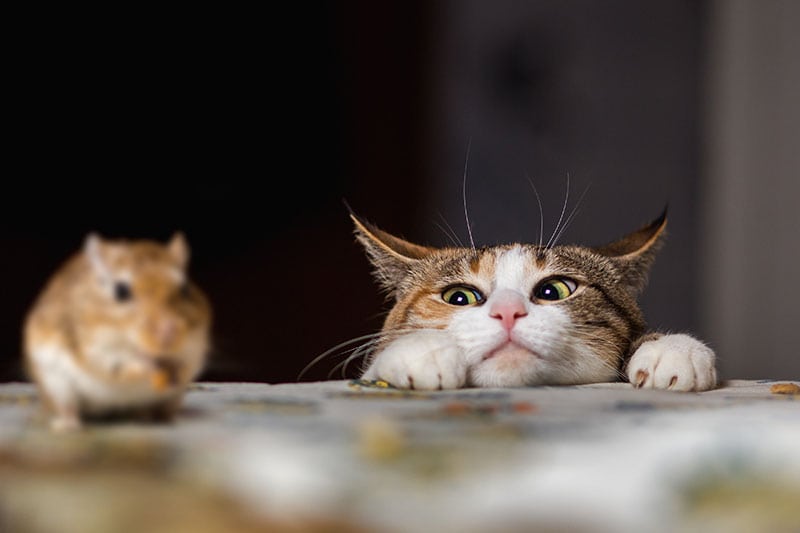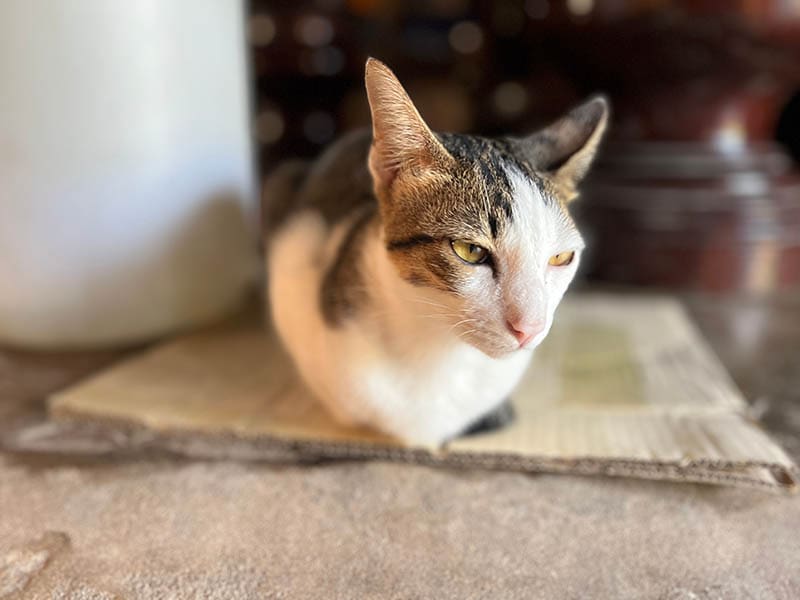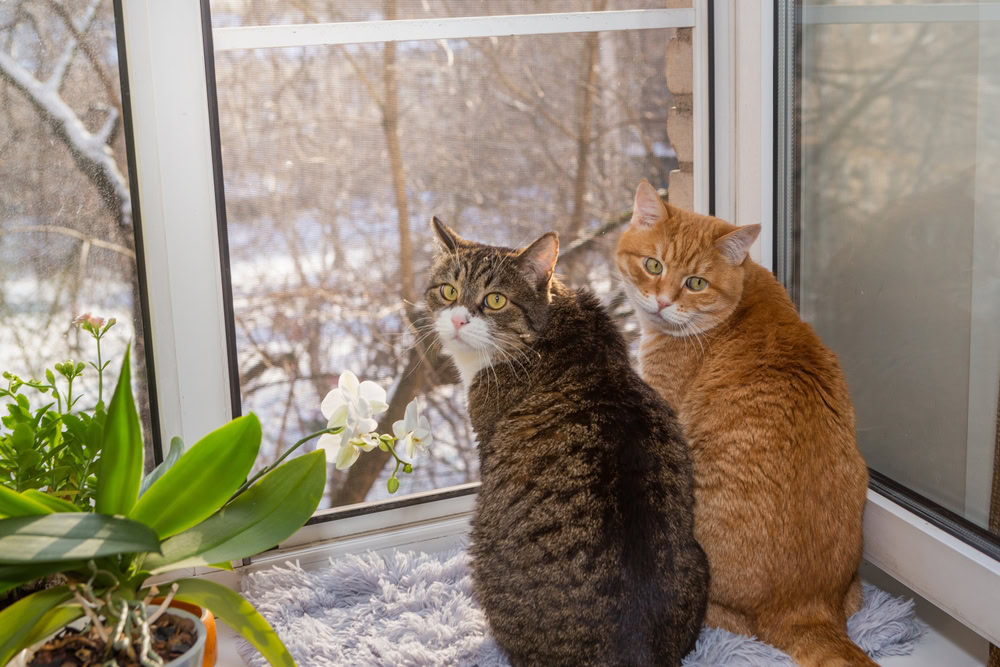VET APPROVED

The information is current and up-to-date in accordance with the latest veterinarian research.
Learn more »One of the least pleasant aspects of cat ownership is dealing with the litter box. It’s bad enough that you have to scoop out and clean your cat’s bathroom, but when they roll around in it, play in it, and spread litter everywhere, it’s even worse. Why do cats roll in their litter box? Is this normal behavior?
The primary reason cats play in their litter boxes is to satisfy their feline instincts. Normal cat play behavior can include scratching, digging, jumping, or rolling around in the litter. However, your cat’s behavior in the litter box can also be a sign of emotional or medical distress.

The 4 Reasons Why Cats Roll in the Litterbox
1. They Are Scent-Marking
If there have been any recent changes in your cat’s life that are causing stress, they may be staking out their territory in the litter box. If you’ve gotten a new pet, had a baby, or moved recently, cats can feel like their home, and their place in it is being challenged. Sometimes they can feel this way simply because you moved their litter box to a new location.
Regardless of the cause, your cat might be feeling like the litter box is the only thing in the world that truly belongs to them, or a safe place where they can be alone and not bothered by anyone. Sitting in the litter box, or rolling in it, leaves your cat’s scent behind for other cats to smell, sending the message that the litter box belongs to them.
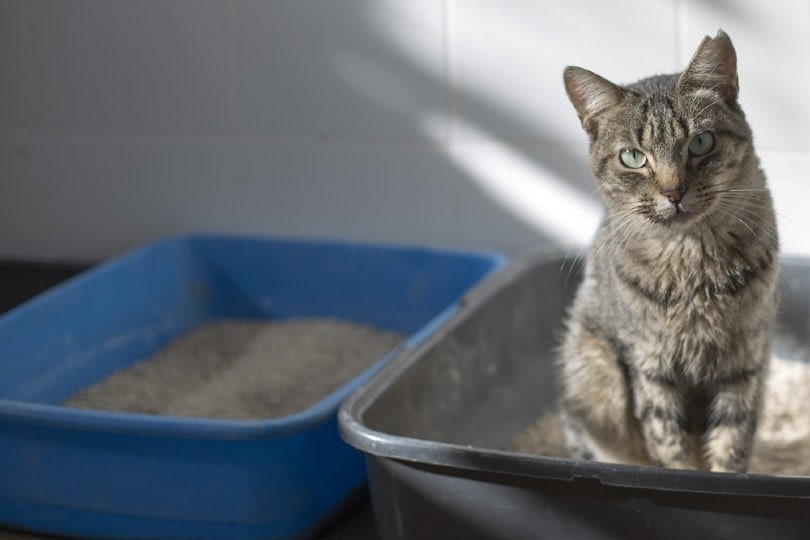
2. They Feel Scared
Cats can experience anxiety just like people. Strangers in the home or a lot of loud noises can scare them and make them want to hide. They consider their litter box a safe place to seek out shelter.
3. They Have a Medical Issue
Rolling in the litter box may indicate that your cat has a medical condition, possibly related to their urinary tract.
Cats may also scratch excessively on the litter, roll on it, or urinate outside. Abnormal litter box behavior should never be overlooked, since it can indicate conditions such as feline idiopathic cystitis, a urinary tract infection, or bladder stones, which always need prompt veterinary intervention.
If you notice that your cat is playing in their litter box, and they aren’t producing as much waste, as usual, accompanied by mood changes or constant meowing, see your veterinarian to rule out a medical problem.
4. They Are Scratching
If you notice your cat rolling around in the litter box, and possibly in other places such as the carpet, it may indicate that your cat is itchy. It can be a sign of skin irritation, parasites, or an allergy. Interestingly, outdoor cats frequently roll around in the grass to remove excess fur or scratch themselves. You should observe your cat and monitor this habit. If you notice this happening every day or your cat overgrooming, make sure to contact your vet for advice.
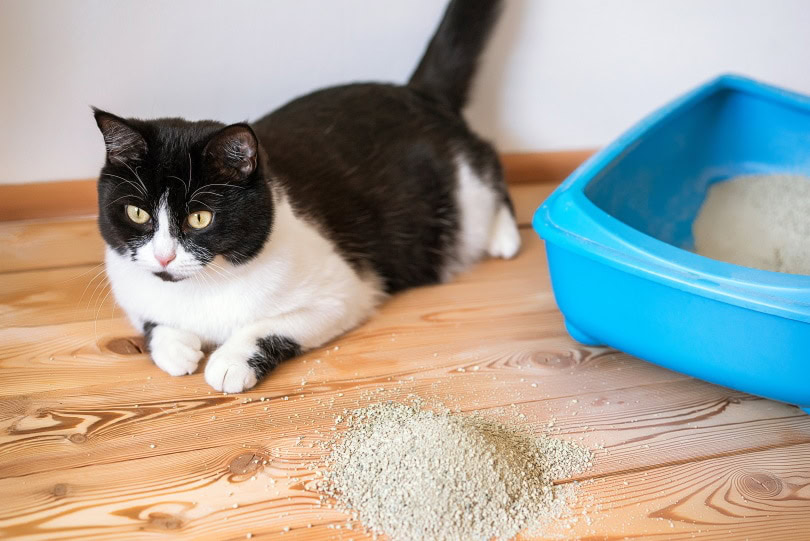

Why Your Cat Might Be Scratching at the Litter Box
Cats who scratch the sides of their litter box could be indicating they are not happy with the conditions inside the box. Cats are very sensitive to odors and like to be clean. It’s not uncommon for cats to refuse to relieve themselves in a dirty litter box. Scratching at the sides is often a clue that it needs cleaning.
Sometimes cats scratch their litter box because they don’t like the litter inside it. Cats aren’t just sensitive to smells; they’re sensitive to textures, too. Litters that come with artificial odors can be offensive to some cats. They may also have a preference for the type of litter you’re using and the material it’s made out of. You might have to do some trial and error with cat litter to find one they like.
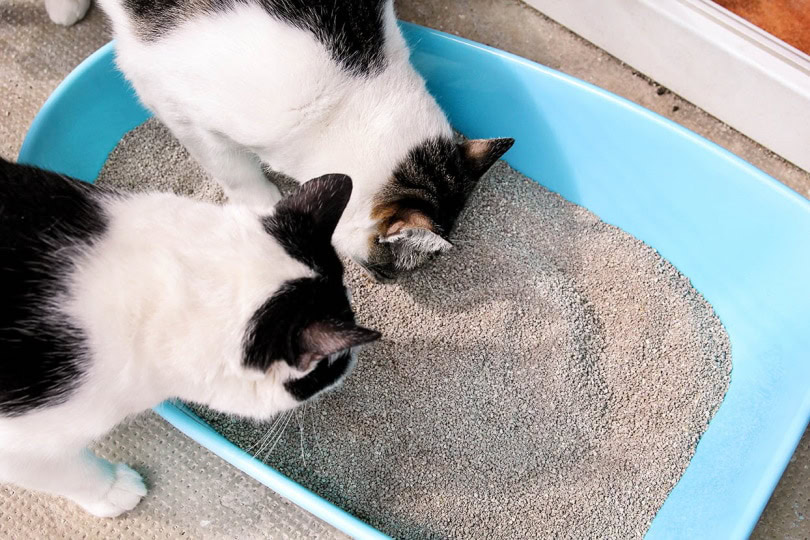
Behaviors Surrounding Litter Box Cleaning
Most cats are overjoyed when you clean their litter box. They like having unsoiled litter to do their business. It’s actually quite common for cats to use the litter box immediately after cleaning.
Cats who are territorial about their litter box will also enter it after it’s cleaned. In order to assert their position or mark their dominance over other cats in the household, they will have to spend some time re-marking their territory and establishing the litter box as theirs.
On occasion, a cat will be so territorial about their litter box that they will be angry or even attack while you’re cleaning it. If this happens, it’s best to shut your cat in another room while you clean the box or make sure they’re distracted with a favorite toy.
How to Stop Your Cat From Rolling in the Litter Box
If you’ve ruled out any medical conditions, and your cat isn’t stressed or territorial, it’s most likely that they are rolling in their litter box out of curiosity, to scratch, to remove fur, or to play. Intact female cats that show rolling behavior could be doing this when they are in heat.
You can help your cat by thoroughly brushing them on a regular basis to remove excess dirt and debris from their coat. This will also relieve any itching they feel on their skin. A shallower litter box with less “playroom” can also help to discourage rolling around. If they don’t have enough room, they won’t do it.
Sometimes it helps to switch from dust litter to a litter made from crystals, pellets, or pine. These materials don’t bear the resemblance to dirt for your cat, and they will be less likely to take a dust bath in them.
If your cat spends time outdoors and it’s safe for them to do so, let them roll around in the dirt outside. This will allow them to satisfy their need to roll in natural materials.
Excessive litter box rolling can indicate an underlying skin condition that your cat is working hard to relieve. If your cat’s rolling is undeterred, see your veterinarian to rule out skin issues.

The 4 Other Ways to Stop Your Cat From Playing in the Litter Box
Not only is rolling in the litter an annoying and frustrating behavior, but it can also get expensive with all the wasted cat litter. Here are five things you can do to stop your cat from using the litter box as a playground.
1. Have Enough Litter Boxes
The general litter box rule when you have more than one cat is to have one box per cat, plus one more. Some cats like a single litter box, while others like the convenience of having them in different locations. If you have more than one cat, you can avoid territorial spats by having different litter boxes, in different locations, for each cat.
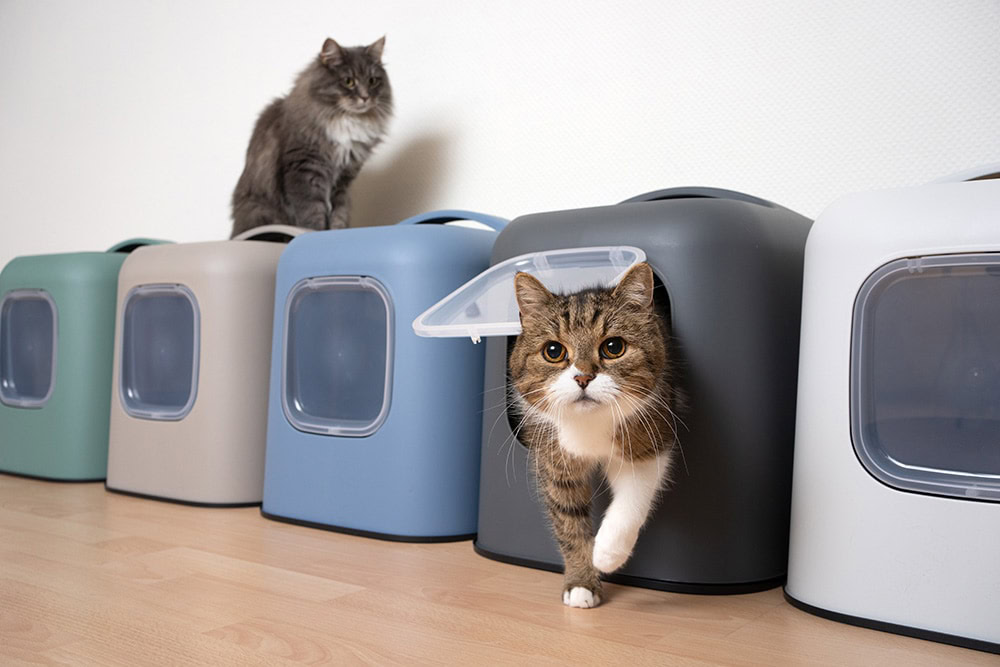
2. Try a Different Type of Litter Box
Make the litter box just a little less comfortable for your cat to play in by switching the type of box. A covered box might offer some privacy and make them less anxious. A self-cleaning box might be too active for them to hang around to play. A shallower depth of litter might be less inviting.
3. Keep the Litter Box Clean
Digging, scratching, and flinging litter are all signs you need fresh cat litter or at least need to scoop out the mess. Clumping litter is the easiest way to quickly clean your litter box on a regular basis.
Even if you keep a clean and tidy litterbox, you probably still find yourself with cat odors and stains around the house – but with the Hepper Advanced Bio-Enzyme Pet Stain & Odor Eliminator Spray, you can permanently remove even the very worst pet stains and smells! Click here to learn more and get yourself a bottle.
- ADVANCED ENZYMATIC CLEANER - Penetrates the most stubborn smells and stains at the deepest molecular...
- FOR ANY MESS, ON ANY SURFACE - This pet odor eliminator cleans your carpets, floors, furniture,...
- FRESH, NATURAL ODOR - Our unique formulation doesn't rely on dangerous or unpleasant chemical...
At PangoVet, we’ve admired Hepper for many years, and decided to take a controlling ownership interest so that we could benefit from the outstanding products of this cool cat company!
4. Meet Your Cat’s Emotional Needs
If your cat is anxious or using their litter box to hide, the problem may have nothing to do with the litter box. If their routine has been altered, recognize that your cat might not be feeling as safe as before. They may need some extra love and attention to be reassured that they’re still important in your life. Be patient and give them time to adjust to new circumstances.
Any time things are a bit out of the ordinary, or something is new in your cat’s life (this can be as simple as a new job where you’re home less often), spend some extra time talking to, cuddling, or playing with your cat. You know them best. If they appear to be having trouble with their emotions, they may need some extra attention for a while.
If the problem persists, you may need to consult a veterinarian or a cat behavior specialist.

Final Thoughts
While cat owners often find it a nuisance, cats consider their litter box a special place. While it can be an indicator of underlying problems, rolling in the litter box is totally normal behavior for your cat. It can also be an indicator of when something is wrong.
The tips listed above will help you to at least reduce the behavior, if not stop it altogether.
Related Reads:
- Why Is My Cat Eating Litter? What To Do and When to Worry
- How To Keep Cats Out Of Your Sandbox (5 Proven Methods)
Featured Image Credit: New Africa, Shutterstock
Contents
- The 4 Reasons Why Cats Roll in the Litterbox
- Why Your Cat Might Be Scratching at the Litter Box
- Behaviors Surrounding Litter Box Cleaning
- How to Stop Your Cat From Rolling in the Litter Box
- The 4 Other Ways to Stop Your Cat From Playing in the Litter Box
- 1. Have Enough Litter Boxes
- 2. Try a Different Type of Litter Box
- 3. Keep the Litter Box Clean
- 4. Meet Your Cat’s Emotional Needs
- Final Thoughts
